Supporting copy for the Request Service
call out button.
Blog
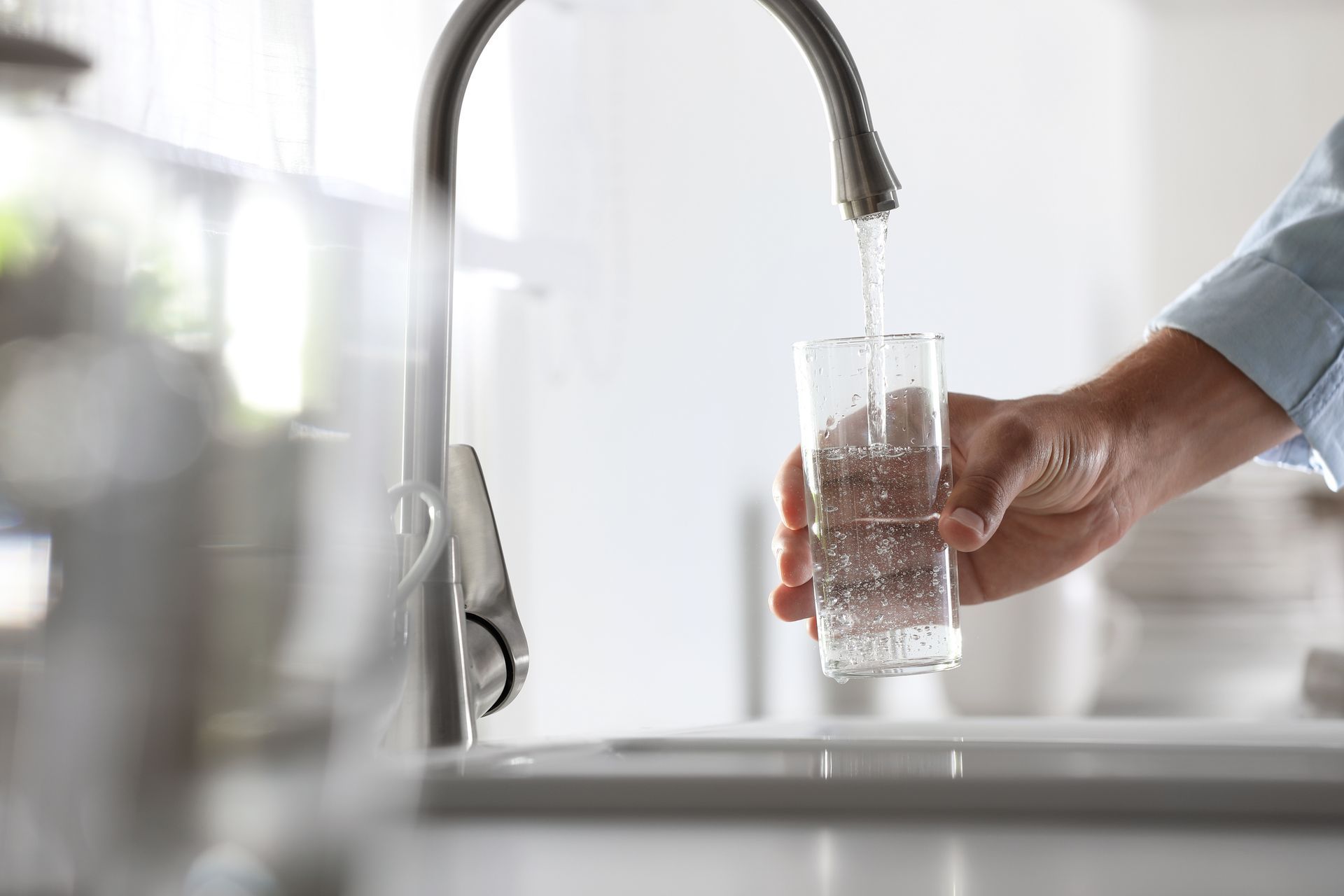
By Aqua Plumbing & Heating, LLC.
•
February 21, 2024
Ever experienced the puzzling moment when you turn on your tap and out comes cloudy water? It's a common occurrence that, while unsettling, has a range of explanations. In this blog, we'll uncover the potential reasons behind cloudy tap water, exploring whether it's a transient issue or something more substantial that warrants attention. Deciphering the Cloudiness: Cloudy tap water, often resembling a milky or white hue, can be linked to various factors. Here are some key contributors: 1. Air Bubbles: Tiny air bubbles can cause temporary cloudiness, especially in cold water. Dissolved gases are released as the water warms up, forming bubbles that create the cloudy appearance. 2. Mineral Content: High mineral content, notably calcium and magnesium, may lead to cloudiness. These minerals can precipitate out of the water, resulting in a hazy appearance, commonly referred to as "hard-water". 3. Temperature Fluctuations: Rapid changes in water temperature can release dissolved gases and minerals, contributing to temporary cloudiness. This phenomenon is more noticeable during colder months with fluctuating water temperatures. 4. Water Pressure: Elevated water pressure can introduce air into the water supply, causing transient cloudiness. This is typically observed during sudden pressure increases, such as during repairs or maintenance in the water supply system. When To Raise An Eyebrow: While cloudy tap water is often harmless and short-lived, there are instances where it might signal a more significant issue: 1. Microbial Contamination: Persistent cloudiness accompanied by an unpleasant odor could indicate microbial contamination. In such cases, prompt water testing for bacteria and contaminants is crucial. 2. Pipe Corrosion: Cloudy water with a metallic taste may point to pipe corrosion, releasing rust particles into the water. Addressing this situation promptly is essential to mitigate the potential health risks. Taking Action: 1. Observe Changes: If the cloudiness is sudden and persistent, pay attention to changes in taste, smell, or color. These indicators can offer clues to the potential cause. 2. Run the Tap: Allowing the tap to run for a few minutes can sometimes clear temporary cloudiness caused by trapped air or mineral precipitation. 3. Contact Your Water Provider: If concerns persist, reach out to your local water provider. They can offer insights into water quality in your area and address any reported issues. Cloudy tap water is a prevalent occurrence with diverse explanations, ranging from benign to potentially concerning. Understanding the causes and recognizing when to seek further investigation ensure your water remains safe and clear. When in doubt, consulting your local water authority or arranging quality testing with Aqua Plumbing & Heating, LLC., can provide you with a peace of mind and uphold continued safety of your drinking water.
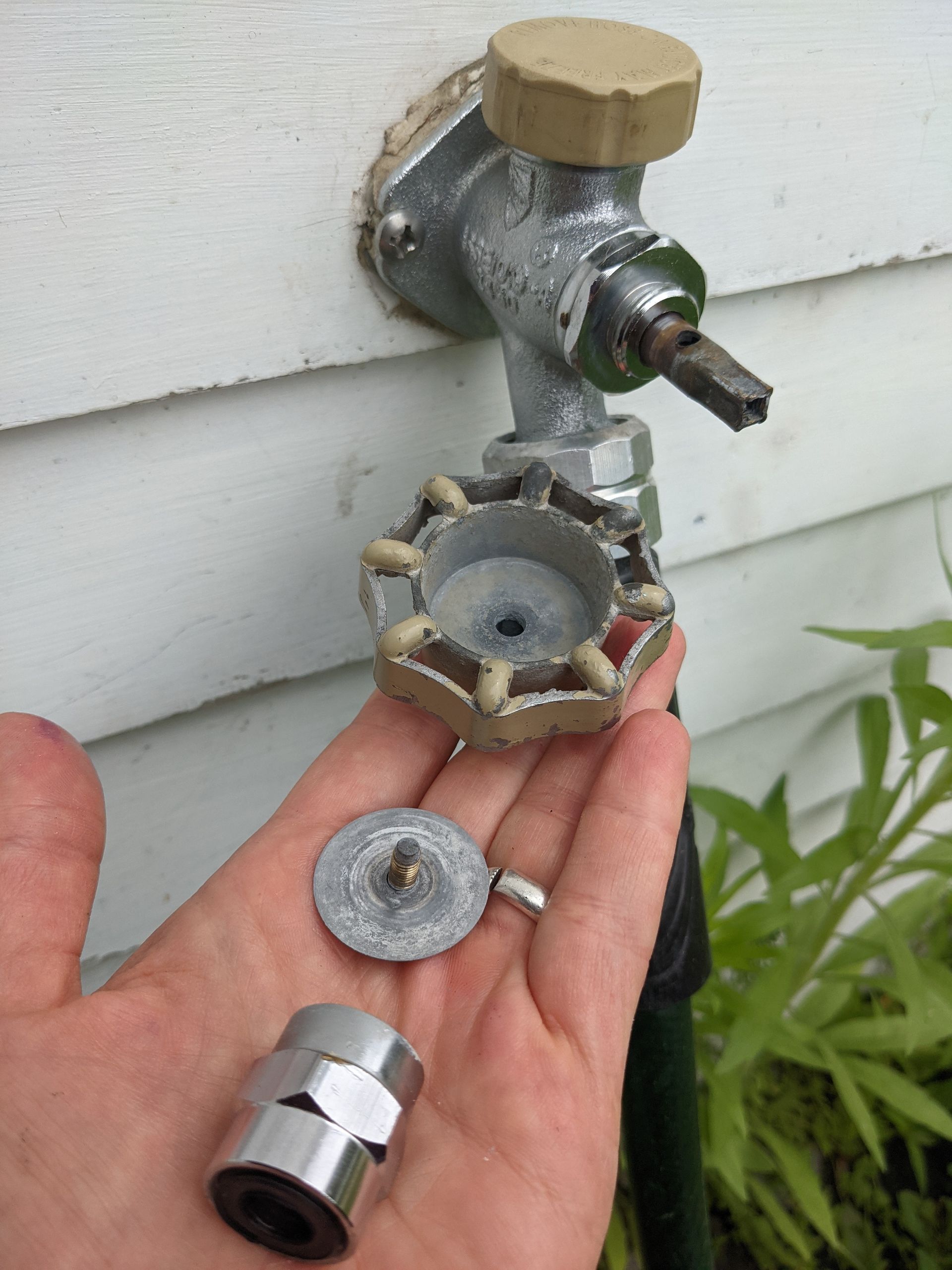
By Aqua Plumbing & Heating, LLC.
•
February 14, 2024
A leaking hose bib not only wastes water but can also lead to increased bills and potential property damage. The good news is that fixing it can be a simple DIY task that requires minimal effort. In this blog, we will guide you through straightforward steps to repair a leaking hose bib, giving you the confidence to address this common issue efficiently. Materials You Will Need: • Adjustable wrench • Pipe wrench • Pipe thread tape • Replacement hose bib (if necessary) Step One: Turn off the water supply and locate the water shut-off valve that is connected to the leaking hose bib, turning it clockwise to shut off the water supply. If a dedicated shut-off valve is not found, turn off the main water supply to your property. Step Two: Remove the hose bib handle using an adjustable wrench loosening and removing the hose bib handle to expose the stem assembly. Step Three: Inspect the washer and the O-ring that is located inside of the hose bibs stem assembly for wear and damage. If needed, replace them with new ones of the correct size and type. Step Four: Apply a few layers of pipe thread tape clockwise around the threads of the hose bib's stem assembly to create a secure, watertight seal during reassembly. Step Five: Carefully reassemble the hose bib, ensuring all components are in their proper place. Tighten the components using an adjustable wrench. Step Six: Once everything is securely in place, turn on the water supply to the hose bib. Check for any leaks. If issues persist, you may need to consider replacing the entire hose bib. Step Seven: If the leak persists after replacing the washer and O-ring, it might be time to replace the entire hose bib. Use a pipe wrench to remove the old hose bib and install a new one, applying pipe thread tape as needed. Fixing a leaking hose bib is sometimes a quick and straightforward DIY task that can save you money and prevent water wastage. By following the above simple steps, you can efficiently address the issue and enjoy a leak-free outdoor water connection. However, if difficulties arise or the problem persists, consulting the pros at Aqua Plumbing & Heating, LLC., is always a wise option.

By Aqua Plumbing & Heating, LLC.
•
February 7, 2024
The use of Epsom salt in pipes is a subject that sparks diverse opinions within the plumbing community. While some tout its potential benefits, others issue warnings about its use. In this detailed blog, we will look into both perspectives to provide a comprehensive understanding of how Epsom salt may or may not impact your plumbing system. Potential Benefits of Epsom Salt for Pipes • Softening Water to Prevent Mineral Buildup: Epsom salt, scientifically known as magnesium sulfate, is reputed for its water-softening properties. The belief is that by introducing Epsom salt into the plumbing system, it can reduce the accumulation of mineral deposits, potentially preventing the formation of stubborn hard water deposits in pipes. • Natural Cleaning and Deodorizing: Advocates of Epsom salt contend that it can serve as a natural cleaning agent. They argue that the salt has the ability to break down organic matter within pipes, acting as a gentle yet effective cleaner. Additionally, the deodorizing properties of Epsom salt may contribute to a more pleasant drain aroma. • DIY Drain Maintenance: DIY enthusiasts often incorporate Epsom salt into homemade drain-cleaning solutions. When combined with hot water, the salt is thought to have the ability to dissolve certain types of blockages, offering a DIY alternative for regular drain maintenance. Concerns and Caution Regarding Epsom Salt Use • Potential Residue Buildup: Opponents of Epsom salt usage express concerns about the possibility of residue buildup over time. The argument is that accumulated residue may exacerbate clogging issues, necessitating professional intervention to address the problem effectively. • Limited Scientific Evidence: Despite its widespread use in various applications, there is a lack of robust scientific evidence specifically supporting the efficacy of Epsom salt in maintaining pipes. The perceived benefits remain largely anecdotal, underscoring the need for a cautious approach. • Risk of Corrosion: Critics highlight potential corrosion risks associated with magnesium, a component of Epsom salt. Prolonged exposure to magnesium may contribute to corrosion, particularly in older pipes or systems made of certain materials. Navigating the Epsom Salt Debate in Plumbing: The utilization of Epsom salt in pipes continues to be a debated topic within the plumbing community. While some individuals report positive outcomes, a cautious approach is advised. If contemplating the use of Epsom salt for pipe maintenance, seeking guidance from plumbing professionals tailored to your specific plumbing system and concerns is highly recommended.
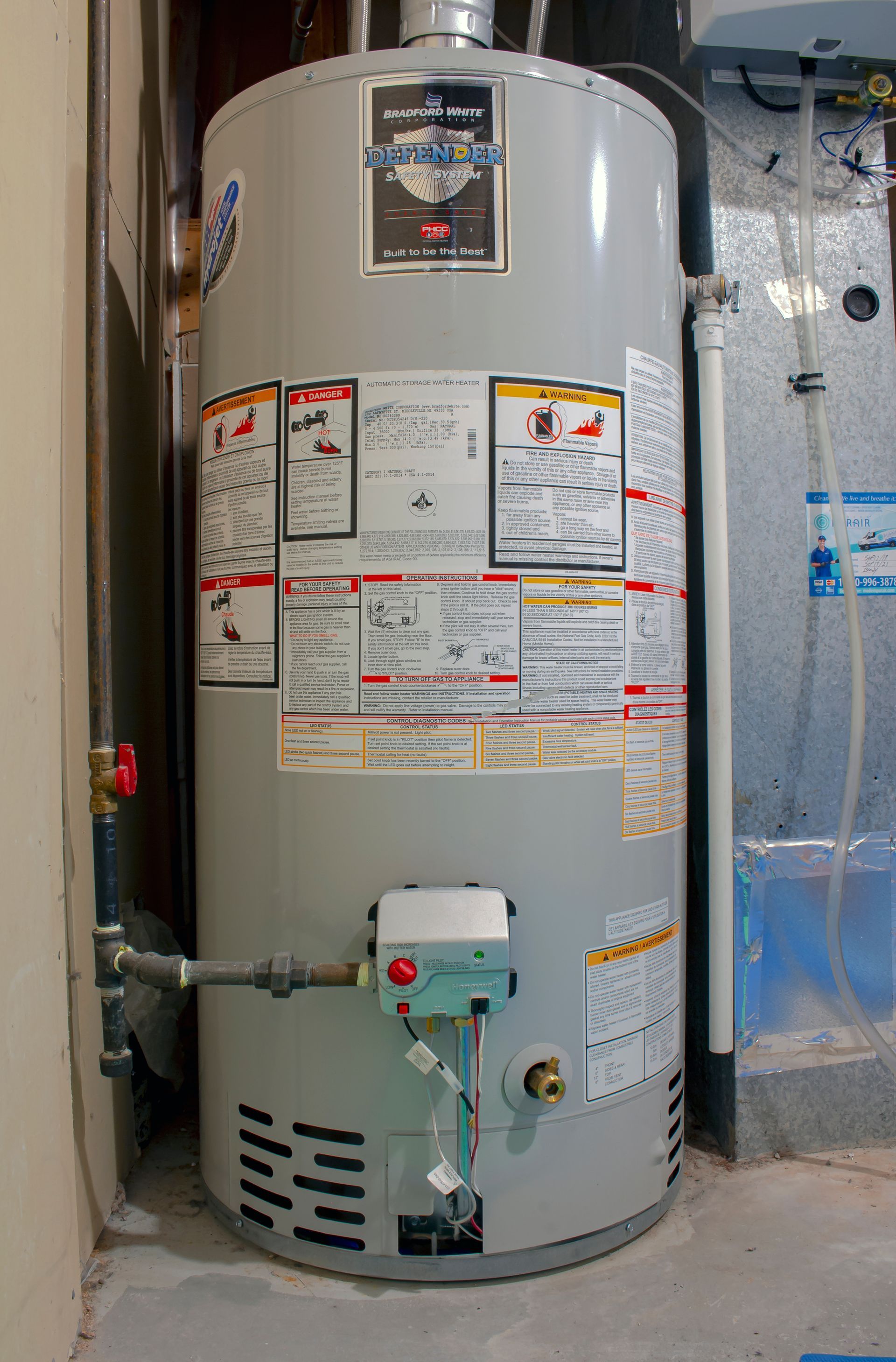
By Aqua Plumbing & Heating, LLC.
•
January 31, 2024
Kickstarting your day with a refreshing shower should be a delight, not a test of patience waiting for hot water. If your water heater seems to be playing hard to get, it's time for a little investigation. Let's dig into the potential culprits causing your water heater to drag its feet and explore practical solutions for a quicker, more efficient hot water experience. Sediment Buildup in the Tank Over the years, sediment, minerals, and debris can form a stubborn layer at the bottom of your water heater tank. This unwanted buildup acts like a thermal blanket, making it challenging for the heating element to operate at its best. Regular tank flushing as part of maintenance can be the key to restoring your water heater's optimal performance. Inadequate Thermostat Settings Take a look at your water heater's thermostat settings to ensure they align with your household's hot water needs. If the thermostat is set too low, your water heater may be taking its sweet time reaching the desired temperature. Adjusting the thermostat to a safe and suitable range, typically around 120 degrees Fahrenheit, can make a noticeable difference. Aging Heating Element The heating element in your water heater doesn't last forever. For electric water heaters, a worn-out heating element may be the culprit, necessitating a replacement. Gas water heaters may experience delays due to issues with the burner or pilot light. Regular checks and timely replacements can keep your water heater in top-notch condition. Water Heater Size and Capacity An undersized water heater can struggle to keep up with the hot water demands of a growing family or changing water usage patterns. If you've outgrown your current setup, upgrading to a larger capacity water heater ensures a timely and plentiful supply of hot water. Plumbing Predicaments Issues with your plumbing system, such as partially closed hot water valve or a misbehaving pressure-reducing valve, can disrupt the smooth flow of hot water. A thorough inspection of your plumbing infrastructure can reveal and remedy any obstructions or faulty components affecting water flow. Professional Inspection and Maintenance When all else fails, calling in the pros at Aqua Plumbing & Heating, LLC., is the smart move. Our licensed team of plumbers can conduct a comprehensive inspection of your water heater, pinpoint the root cause of the delay, and recommend the most effective repairs or replacements to get your hot water flowing seamlessly again. A water heater that takes its time can be a daily annoyance. By promptly addressing potential issues and embracing regular maintenance, you can transform your water heater into a reliable source of immediate, comfortable water heater. If uncertainties persist, don't hesitate to contact Aqua Plumbing & Heating, LLC., to consult with a qualified plumbing professional for advice and solutions crafted to suit your specific situation. Your comfort is our priority!
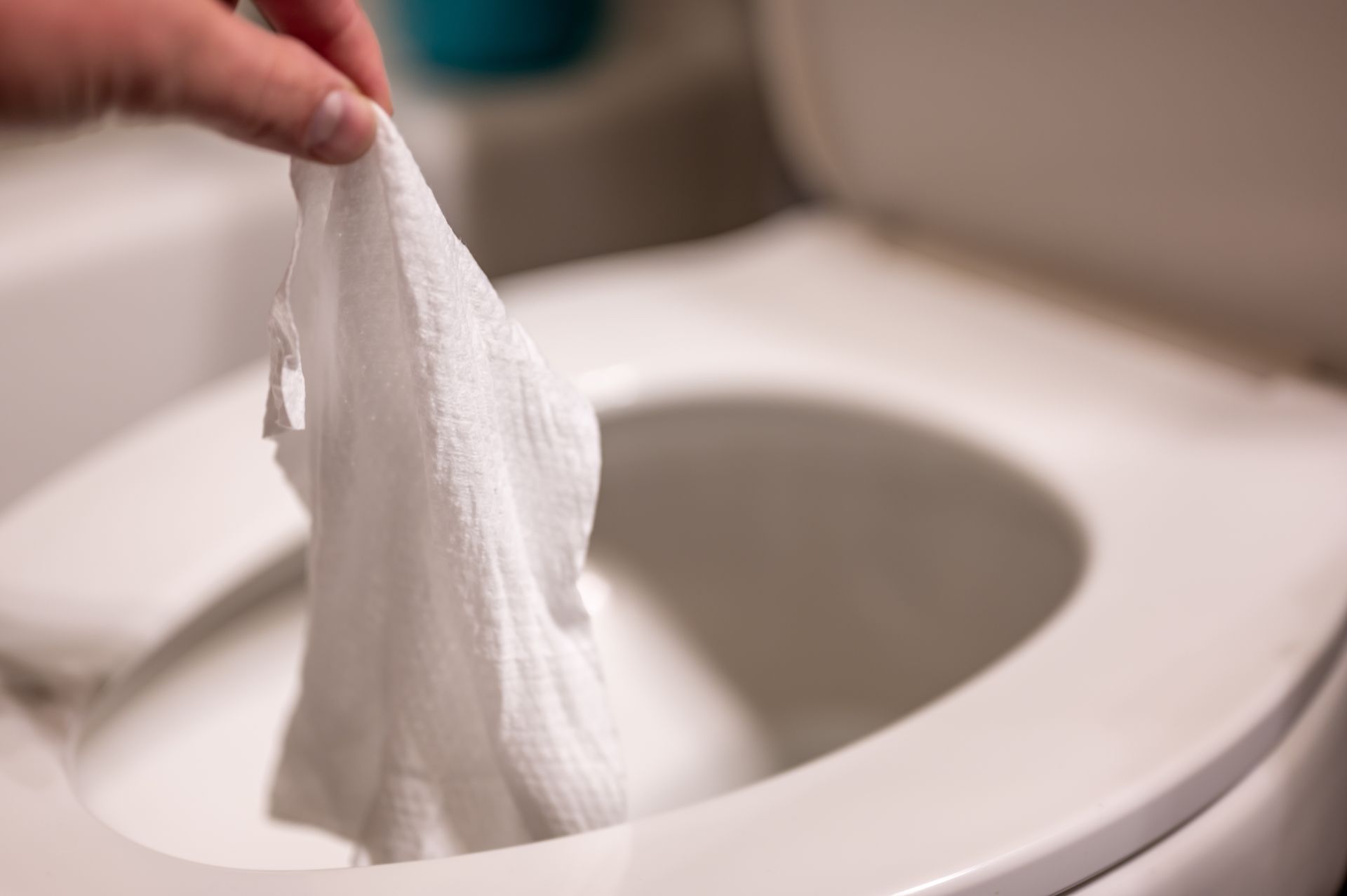
By Aqua Plumbing & Heating, LLC.
•
January 24, 2024
In recent years, flushable wipes have gained popularity as a convenient alternative to traditional toilet paper. However, the safety of flushable wipes for both plumbing systems and the environment has become a subject of extensive debate. Let's explore this topic further to uncover the reality behind the safety claims of flushable wipes. Understanding Flushable Wipes: Flushable wipes are pre-moistened wipes intended for personal hygiene, often marketed as safe for disposal by flushing down the toilet. They're promoted as more effective for cleansing and gentler on the skin compared to dry toilet paper. The Myth of Flushable Wipes: Despite being labeled as "flushable," these wipes raise several safety concerns: Plumbing Issues: Flushable wipes do not disintegrate as quickly as toilet paper, leading to potential accumulation and causing clogs or blockages in household pipes. These issues can extend to municipal sewer systems, resulting in costly repairs and disruptions. Environmental Impact: Unlike toilet paper, which readily dissolves upon contact with water, flushable wipes can persist longer in water systems. They contribute to blockages in sewer lines and pose environmental threats, causing harm to aquatic ecosystems. What Makes Flushable Wipes Unsafe? The safety risks associated with flushable wipes are rooted in their composition and breakdown process: Material Composition: Most flushable wipes are made from non-biodegradable materials like polyester or polypropylene. Unlike toilet paper designed for rapid breakdown in water, these materials do not disintegrate easily, leading to plumbing complications. Misleading Labeling: The term "flushable" can be deceptive. While these wipes can be flushed, their slower breakdown can cause significant problems in plumbing systems, unlike toilet paper engineered for swift disintegration. Risks and Alternatives: Using flushable wipes can pose the following risks: • Plumbing Blockages: Accumulation of wipes in pipes can result in expensive plumbing repairs and inconvenience. • Environmental Concerns: Non-biodegradable wipes contribute to sewage system blockages and adversely affect aquatic environments. Safe Disposal and Alternatives: To mitigate plumbing issues and reduce environmental impact, consider these actions: • Proper Disposal: Instead of flushing, dispose of wipes in the trash to prevent plumbing and sewer complications. • Eco-Friendly Alternatives: Explore biodegradable wipes, specifically designed for safe disposal and minimal environmental impact. Despite being marketed as "flushable," flushable wipes might not be as safe for plumbing or the environment as claimed. Their non-biodegradable composition can lead to clogs and environmental harm. To avert plumbing problems and environmental impact, refraining from flushing wipes and opting for eco-friendly alternatives or toilet paper designed for swift breakdown upon flushing is advisable. Choosing environmentally conscious options ensures both plumbing safety and ecological responsibility.

By Aqua Plumbing & Heating, LLC.
•
January 17, 2024
Water is a fundamental necessity for life, and having access to clean, safe drinking water is vital for maintaining optimal health and well-being. However, the quality of tap water can vary significantly due to various factors, prompting many homeowners to consider using water filters to ensure their water is safe and enjoyable to drink. Understanding Water Quality: The water supplied to homes typically undergoes treatment to remove impurities and contaminants. Despite this, it may still contain trace elements, sediment, or potential pollutants, depending on the water source and the infrastructure it passes through before reaching your tap. Reasons to Consider a Water Filter: Here are compelling reasons why installing a water filter in your home could be beneficial: 1. Removal of Contaminants: Water filters effectively eliminate impurities such as chlorine, lead, bacteria, pesticides, and heavy metals, ensuring cleaner and safer drinking water. 2. Improved Taste and Odor: Filtering significantly enhances the taste and smell of water by eliminating unpleasant odors and flavors caused by chlorine or organic matter. 3. Protection Against Health Risks: Filtering out harmful contaminants safeguards against potential health risks associated with consuming contaminated water, particularly crucial for vulnerable groups like children or individuals with compromised immune systems. 4. Reduction of Sediment: Filters trap sediment and particles, preventing them from entering your drinking water and potentially clogging faucets or appliances. 5. Environmental Impact: Using a water filter reduces reliance on single-use plastic bottles, contributing to an eco-friendlier approach by minimizing plastic waste. Different Types of Water Filters: Several types of water filters are available, each catering to specific filtration needs: Activated Carbon Filters: Efficiently remove impurities through absorption, eliminating chlorine, volatile organic compounds (VOCs), and some chemicals. Reverse Osmosis Systems: Utilize a semipermeable membrane to remove a broader spectrum of contaminants, including heavy metals and microbes. UV Filters: Use ultraviolet light to sterilize and eradicate bacteria, viruses, and other microorganisms, ensuring water safety. Faucet-Mounted Filters: Easily attach to faucets, providing a cost-effective way to filter water for drinking and cooking purposes. Determining the Need for a Water Filter: Consider these factors when deciding whether a water filter is necessary for your home: • Water Quality Reports: Review local water quality reports to understand the composition of your tap water provided by municipal authorities. • Health Concerns: If anyone in your household has health issues or if your water has an unpleasant taste or odor, a water filter might be beneficial. • Budget and Preferences: Assess your budget and preferences concerning filter type, maintenance, and installation before making a decision. While tap water undergoes treatment to meet safety standards, additional filtration can further enhance its quality, taste, and safety. A water filter can be a valuable investment, ensuring that your household receives clean, healthy, and enjoyable drinking water. Evaluate your water quality, health considerations, and preferences to determine if a water filter is a suitable addition to your home. It not only provides peace of mind but also promotes better health for you and your family.

By Aqua Plumbing & Heating, LLC.
•
January 10, 2024
Your home’s main water line serves as the backbone of your plumbing system, supplying water to every corner of your household. However, wear, tear, and various issues can compromise this essential infrastructure over time. Identifying signs that hint at a need for a main water line repair can aid in swift resolution, averting further damage and inconvenience. Below are common indicators to watch for: 1. Decreased Water Pressure: A noticeable drop in water pressure across multiple faucets or fixtures might point to a potential main water line issue. Reduced flow or weak pressure could signal a blockage or leak in the line. 2. Sudden Surge in Water Bills: Unexpected spikes in your water bills despite unchanged consumption patterns may indicate an unseen leak or damage within the main water line. Monitoring unexplained increases in billing can unveil underlying issues. 3. Water Puddles or Wet Patches in the Yard: Visible pools or consistently damp spots in your yard, especially during dry weather, could signify an underground leak in the main water line. Such wet areas may arise due to a cracked or damaged pipe. 4. Unusual Noises in Plumbing: Gurgling or bubbling sounds emanating from pipes when water isn't in use could suggest air or water escaping from a compromised main water line. These sounds might become pronounced when water is shut off. 5. Discolored or Turbid Water: The presence of rusty or murky water flowing from faucets may indicate the infiltration of sediment or rust due to damage or deterioration in the main water line. 6. Slow Drainage or Persistent Blockages: Frequent clogs, slow drainage, or recurrent backups in sinks, toilets, or showers might signal an obstruction or impairment in the main water line, impeding proper wastewater flow. 7. Unpleasant Odors: The detection of foul smells resembling sewage or a musty odor, particularly from drains or the yard, could signify a main water line issue, especially when accompanied by other symptoms like wet patches. 8. Sinkholes or Foundation Cracks: Sinkholes forming in the yard or unexplained cracks surfacing in your home’s foundation might result from a significant main water line leak, causing soil erosion or structural damage. Addressing the Issue: Upon noticing any of these signs, prompt action is crucial. Contacting a licensed plumber experienced in main water line repairs for a professional assessment and timely resolution is highly recommended. Swift repairs can prevent further damage and ensure the uninterrupted functioning of your home’s water supply system. In conclusion, remaining vigilant about these signs can assist in the early detection of potential main water line issues, facilitating prompt repairs and averting escalating damage. Regular inspections and maintenance by professional plumbers are instrumental in identifying and resolving issues before they escalate. Timely attention to main water line problems not only upholds the integrity of your plumbing system but also prevents water wastage and potential property damage. Stay proactive and maintain your home's water supply system to ensure a hassle-free living experience!
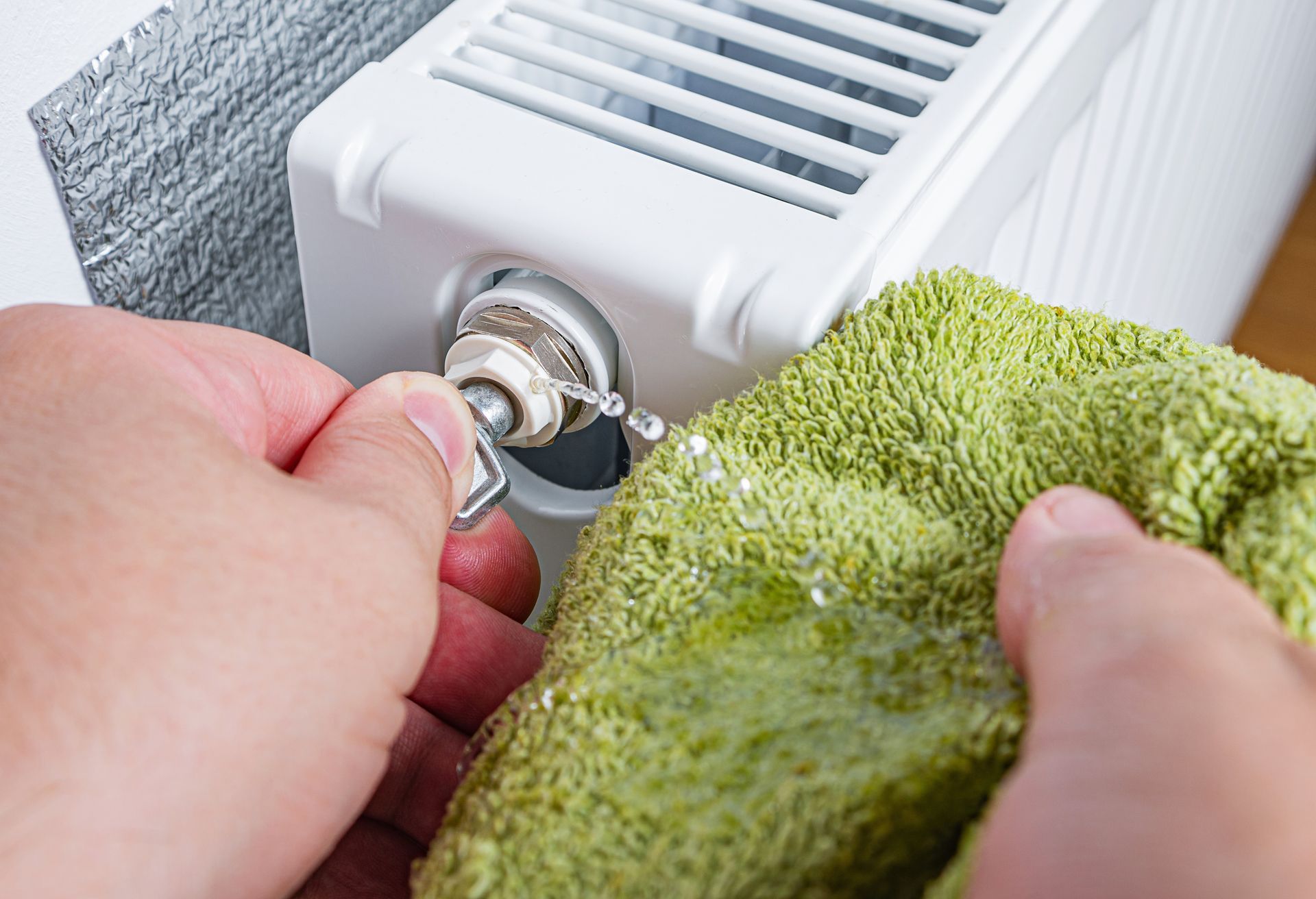
By Aqua Plumbing & Heating, LLC.
•
January 3, 2024
Hot water radiators are a reliable source of warmth during chilly seasons, but over time, they can accumulate trapped air, hindering their efficiency. If you notice uneven heating or cold spots on your radiators, bleeding them is a simple yet crucial maintenance task. Bleeding helps release trapped air, allowing hot water to circulate freely and ensuring optimal performance to keep your home cozy and warm. Here’s a step-by-step guide on how to bleed your hot water radiators: Understanding the Process: Bleeding a radiator is the process of removing trapped air that has gathered within the system. Air naturally enters the radiators over time and rises to the top, forming air pockets that obstruct the flow of hot water. Bleeding eliminates this trapped air, enabling the radiator to distribute heat evenly. Tools You'll Need: Before you begin, gather the following tools: • Radiator key or a flat-headed screwdriver (depending on your radiator's valve type) • A cloth or towel • A container to catch any water Step-by-Step Guide: 1. Turn off the Heating System: Switch off your heating system and allow the radiators time to cool down. This step is crucial for safety and prevents potential hot water spills during the bleeding process. 2. Locate the Bleed Valve: Identify the bleed valve on each radiator. It’s typically found at the top, usually near one end, and appears as a small square-shaped nut or a round knob. 3. Preparation: Place a cloth or towel under the radiator’s bleed valve to catch any water spills. Have your container ready to collect any water. 4. Bleeding the Radiator: Insert the radiator key or screwdriver into the valve and gently turn it counterclockwise. You may hear a hissing sound as trapped air escapes. Continue turning until water flows steadily without air bubbles. 5. Secure the Valve: Once water flows consistently, carefully tighten the valve by turning it clockwise. Ensure it's securely closed to prevent leaks. 6. Check Other Radiators: Repeat the bleeding process for any other radiators in your home showing similar issues. 7. Restart the Heating System: Once all radiators are bled, turn your heating system back on and confirm that they heat evenly and efficiently. Additional Tips for Maintenance: Bleed your radiators annually or when you notice cold spots to maintain optimal efficiency. Regular bleeding enhances your heating system's efficiency, potentially reducing energy consumption. Safety Precautions: • Always turn off the heating system before attempting to bleed radiators. • Use caution when handling hot radiators and water. By following these steps, you can ensure that your hot water radiators function at their best, providing a consistently warm and comfortable home throughout the winter months. Remember, if you're uncertain or uncomfortable with the process, contacting the pros at Aqua Plumbing & Heating, LLC., is advisable. Stay warm and cozy!
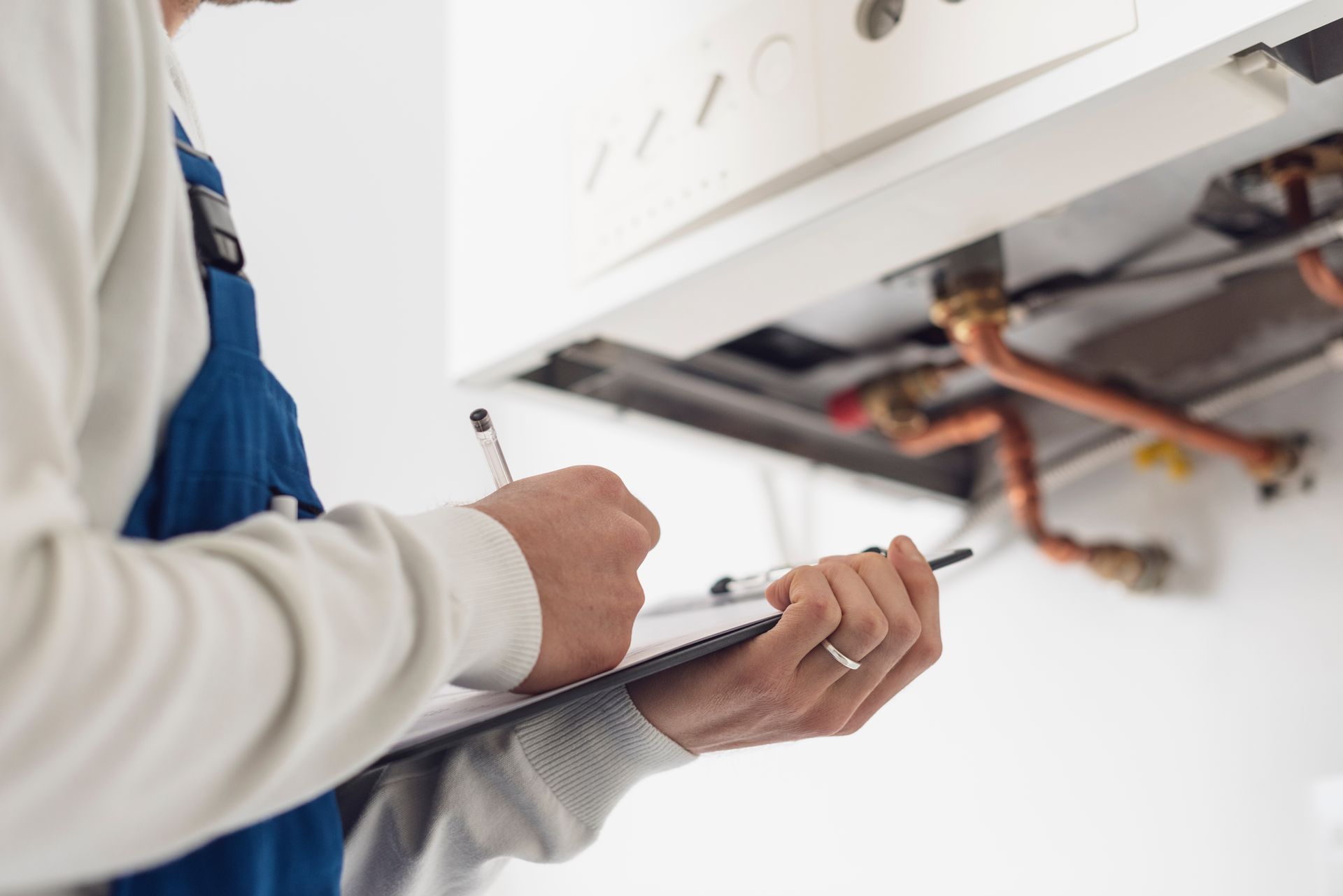
By Aqua Plumbing & Heating, LLC.
•
December 27, 2023
Your home's plumbing is a silent hero, working tirelessly behind the scenes. However, it requires regular care and attention to keep it running smoothly. The question arises: How often should you inspect your plumbing to ensure it's in optimal condition? Let's explore this vital aspect of home maintenance. Frequency of Inspections 1. Yearly Professional Check-Ups: Schedule a comprehensive plumbing inspection with the pros at Aqua Plumbing & Heating, LLC., at least once a year. An annual assessment allows us to conduct a thorough evaluation of your entire plumbing system. Early detection of issues like leaks, corrosion, or clogs can prevent them from turning into major headaches. 2. Seasonal Maintenance: Complement annual inspections with seasonal checks. Before winter sets in, insulate pipes to prevent freezing and potential bursts. Come springtime, inspect outdoor fixtures, gutters, and downspouts for any damage that might affect drainage. 3. Regular Self-Checks: Incorporate routine self-checks every few months into your home maintenance routine. Look for visible signs such as leaks, fluctuations in water pressure, or unusual sounds like dripping faucets or running toilets. Keep an eye out for mold or mildew growth, which might signify underlying leaks. Indications for Immediate Inspections: Certain signs warrant an immediate plumbing inspection, irrespective of the maintenance schedule: • Unexplained spikes in water bills. • Persistent foul odors from drains. • Reduced water pressure in faucets or showers. • Water stains or discoloration on walls or ceilings, • Audible sounds of running water when fixtures aren't in use. • Visible signs of leaks, dripping faucets, or moisture around pipes. Importance of Regular Inspections: • Preventing Emergencies: Regular inspections nip potential issues in the bud, preventing them from escalating into costly emergencies. • Preserving Property Value: Maintaining a healthy plumbing system safeguards your property against water damage, preserving its value and integrity. • Cost-Efficiency: Timely detection and repairs save you from expensive repairs caused by water damage. Seeking Professional Help: While self-checks are valuable, consulting with the pros at Aqua Plumbing & Heating, LLC., annually is vital. Our licensed plumbers possess the expertise and tools to identify hidden issues that may go unnoticed during self-checks. Regular plumbing inspections are essential to maintain the functionality and longevity of your home's plumbing system. Combine professional assessments with self-checks and immediate attention to any plumbing red flags. Proactive maintenance not only ensures a well-functioning plumbing system but also shields your home from potential water damage. Consult with the pros at Aqua Plumbing & Heating, LLC., for regular inspections and addressing concerns promptly is the cornerstone of a healthy plumbing system and a stress-free home.
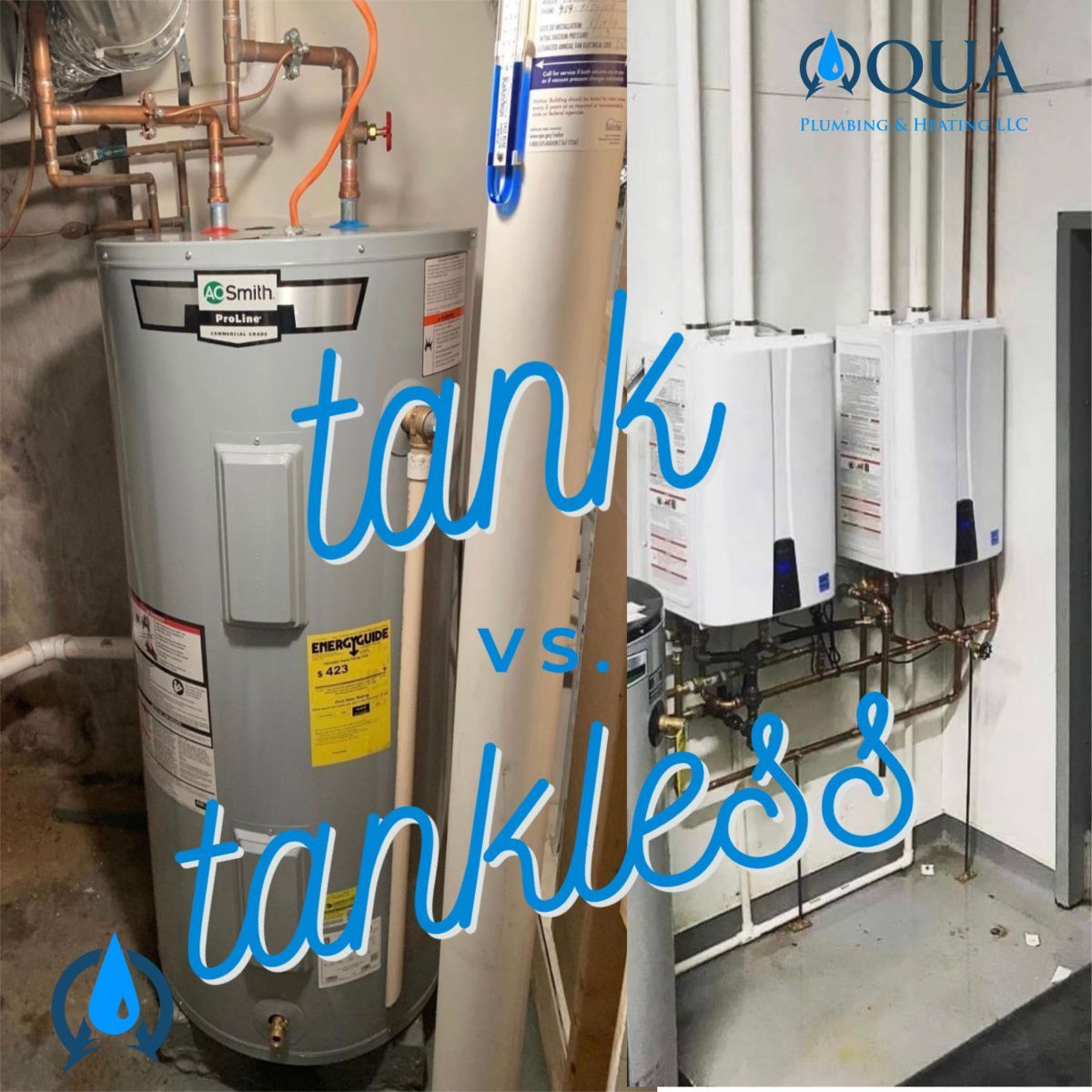
By Aqua Plumbing & Heating, LLC.
•
December 20, 2023
Selecting the ideal water heater for your home involves weighing the benefits and trade-offs between tankless and standard models. Other options offer distinct advantages and considerations, making it crucial to comprehend their disparities to make an informed decision. Standard Water Heaters: • How It Works: These conventional units come with a tank that stores and heats a specific volume of water, typically ranging from 30 to 80 gallons. The stored water remains constantly heated, ready for use at any time. • Pros: Standard water heaters generally have lower initial costs, and installation is often straightforward, especially when replacing an existing unit. • Cons: They tend to be less energy-efficient since they continuously maintain water at a set temperature, leading to potential energy wastage. Their lifespan typically ranges around 10-15 years. Tankless Water Heaters: • How It Works: Tankless water heaters heat water directly as it flows through the unit without storing it in a tank, providing hot water on demand. • Pros: Tankless models are highly energy efficient as they only heat water when needed, potentially resulting in reduced energy costs. They boast a longer lifespan, typically lasting around 20 years or more, and require less space than standard units. • Cons: Initial installation costs for tankless water heaters are generally higher. They may necessitate specific modifications to your home's gas line or electrical system, depending on the chosen model. Key Considerations When Choosing: 1. Assess Hot Water Demand: Evaluate your household's hot water usage. Tankless heaters are suitable for smaller households with lower hot water demand, while standard units are better for larger households with higher usuage. 2. Space and Installation: Tankless heaters are space-saving but may require adjustments to your home's infrastructure during installation. Standard heaters, although bulkier, often have simpler installation processes. 3. Energy Efficiency: Tankless models, heating water on demand, tend to be more energy efficient, potentially leading to long-term savings on energy bills. 4. Upfront Costs vs. Long-Term Savings: While tankless water heaters have higher initial costs, they might offer greater energy savings and a longer lifespan, possibly offsetting the initial investment. In conclusion, both tankless and standard water heaters have their merits and drawbacks. Assessing your household's specific needs, available space, and budget is pivotal in determining the best-suited water heater for you. Consulting the pros at Aqua Plumbing & Heating, LLC., can provide valuable insights into the most suitable option for your home. Ultimately, making an informed decision ensures you select the water heater that aligns best with your comfort, efficiency, and long-term savings goals.
Our Facebook Feed
Contact Us
Aqua Plumbing & Heating LLC
2534 Orthodox Street
Philadelphia, PA 19137
Hours of Operation:
Mon-Fri: 7:00AM - 8:00PM
Sat: 8:00AM - 6:00PM
Sun: 9:00AM - 2:30PM

Privacy Policy
| Do Not Share My Information
| Conditions of Use
| Notice and Take Down Policy
| Website Accessibility Policy
© 2025
The content on this website is owned by us and our licensors. Do not copy any content (including images) without our consent.





